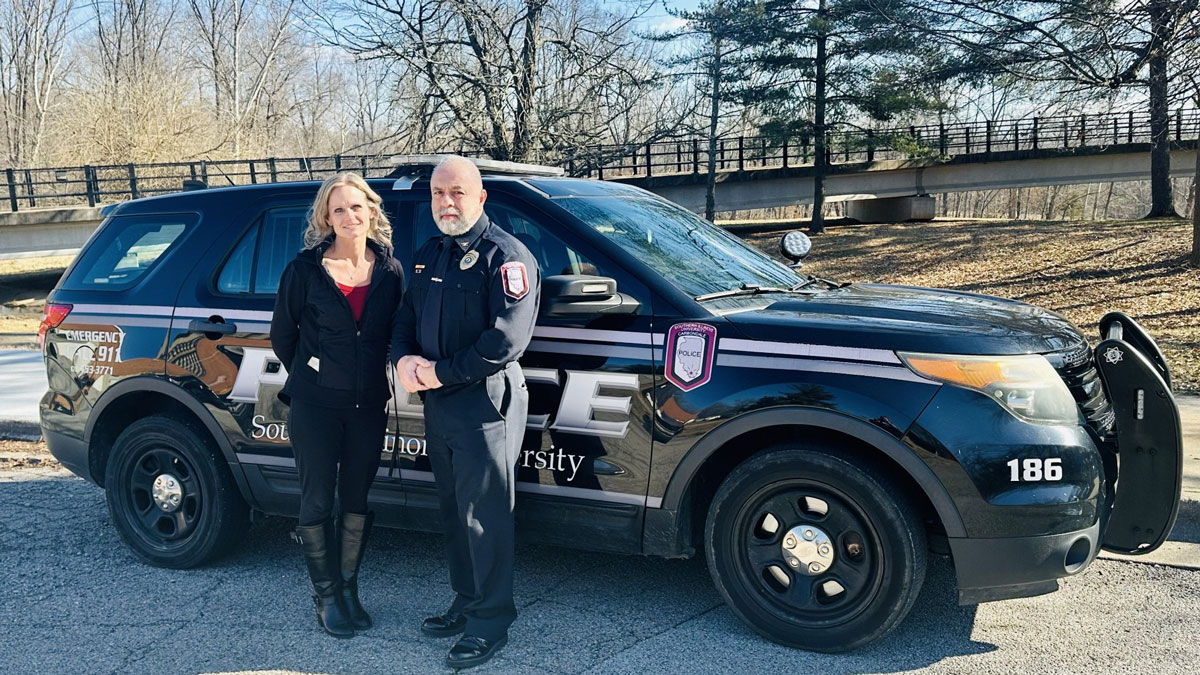
Jaime Clark, director of Student Health Services, and Ben Newman, director of public safety and chief of police, are helping lead the new CAPS Plus program. (Photo provided)
April 21, 2025
SIU pioneers mental health response program for emergency calls
CARBONDALE, Ill. — Thanks to a new grant-funded program, responders with specialized skills in mental health are available to assist when needed in emergency calls at Southern Illinois University Carbondale, de-escalating situations, improving outcomes and helping students stay in school, officials said.
SIU’s Department of Public Safety, Counseling and Psychological Services and others have developed a collaborative response team, funded by an Illinois Board of Higher Education Mental Health Early Action on Campus Competitive Grant of $290,000.
“SIU is leading the way in establishing this comprehensive, groundbreaking program – one of the first of its kind in the nation,” said Jaime Clark, director of Student Health Services, which oversees CAPS. “It will have a huge impact providing students, faculty and staff who are in crisis with timely mental health support, interventions and resources. With mental health providers on the frontline, we hope to increase access to quality care, decrease hospitalizations by providing in-the-moment interventions, and destigmatize help-seeking behaviors.”
Benjamin Newman, SIU’s director of public safety and chief of police, said crisis counselors will provide an alternative to traditional policing tactics because “successful, compassionate resolution is the ultimate goal.”
“We recognize that those in crisis may benefit from intervention services not specifically provided by a law enforcement agency,” said Newman. “If an officer encounters a student, faculty or staff member having what may be a mental health issue or crisis, a trained mental health professional will be contacted to assist when the situation is safe.”
How it came about
Last year, SIU’s DPS responded to 49 mental health related incidents, and campus health and public safety officials have been studying how to best respond to these calls. Participants in a campus student mental health focus group discussed tragic events that had occurred in the national news, and they expressed concerns about armed police officers responding to students in crisis, according to Shelly Ridgeway, assistant director of Student Health Services and director of Wellness and Health Promotion Services.
She said current research indicates that vulnerable populations’ mental health may become exacerbated when officers respond and that some students from marginalized communities distrust the police. In response, Student Health Services used the grant to develop a response model based on current best practices to ensure students and others, especially vulnerable populations, receive immediate support and be directly linked to appropriate treatment and follow-up care.
How it works
The collaborative mental health response teams started forming in February and comprise DPS, CAPS, clinicians, campus administrators, academic faculty and community stakeholders such as staff from emergency rooms and local counseling or rehabilitation centers. Team members soon afterward began critical incident response and crisis intervention training. They are undergoing enhanced training on symptoms of mental illnesses, developmental disabilities, trauma, dementia and delirium, along with de-escalation techniques, intervention skills, and coordination of assessment and smooth transitions to treatment services.
DPS dispatchers are also receiving training to screen and de-escalate calls that may involve mental health issues. When such an incident is identified, the dispatcher notifies the team.
This approach not only increases access to mental health support services for students, especially those reluctant to employ available treatments, but also ensures that students experiencing mental health crises don’t suffer consequences of their behavior. Officials say this will significantly reduce institutional barriers for students with undiagnosed mental health conditions and improve retention and completion rates for those historically left behind.
“The hope is that students, faculty or staff with mental health needs will be identified and linked to appropriate treatment,” Ridgeway said. “They will be supported during crises and critical incidents and provided with follow-up care information and referrals to campus and community resources.
“Students who require hospitalization will receive assistance through the process and support in follow-up treatment and academic accommodations. They will be able to address individual barriers to recommended treatment in order to be healthy and stable. In addition, because the team members are involved with the situation, they can provide administrative support to ease the burden if students pursue mental health leaves or advocate for retention instead of suspension in disciplinary hearings.”
Clark said that in the vast majority of cases due to the timely involvement of mental health support services on site, people are able to receive the assistance and care they need quickly and get plans established to ensure their safety and well-being so they can avoid expensive hospital examinations.
She said the program is already accomplishing its goals and drawing interest from numerous other universities across the country.
Comprehensive care for students
Clark and Ridgeway said the new initiative is another effective element of SIU’s large storehouse of student health services. Comprehensive services include medical care, counseling, and wellness and health promotion services.
Check out all of the numerous services and programs SIU’s Student Health Services offers at shc.siu.edu or learn more on the Facebook page or Instagram.
